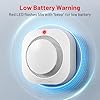Your home is your safe haven, so you want to make sure it’s as protected as possible. One way to do this is by installing heat detectors. But how many do you need?
Contents
How many heat detectors do I need for my home?
The answer to this question depends on a few factors, such as the size of your home, the layout of your home, and your personal preferences.
But you need at least one heat detector in each room of your home.
How do heat detectors work?
Heat detectors work by sensing the temperature of the air around them. When the temperature rises to a certain level, the heat detector will sound an alarm.
What are the benefits of heat detectors?
There are several benefits of heat detectors, including the fact that they can detect a fire before it becomes visible, they are less likely to cause false alarms than smoke detectors, and they can be used in areas where smoke detectors would not be effective (such as kitchens).
Are there any drawbacks to heat detectors?
There are a few drawbacks to heat detectors, such as the fact that they cannot detect a fire that is not producing heat (such as an electrical fire), they can be set off by other sources of heat (such as a stove), and they require more maintenance than smoke detectors.
How can I choose the right heat detector for my home?
When choosing a heat detector for your home, you should consider the size of your home, the layout of your home, your personal preferences, and the specific needs of your family.
How many heat detectors do I need for my business?
There is no definitive answer to this question as it depends on a number of factors, including the size and layout of your premises, the level of risk, and the type of business you operate. However, as a general guide, we recommend one heat detector for every 500 square feet of floor space. If you have a high-risk business, such as a kitchen, you may need more heat detectors.
Heat detectors are an important part of your fire safety system and can help to save lives and protect your property. If you are unsure about how many heat detectors you need, please contact a professional fire safety company for advice.
The benefits of having heat detectors in your home
When it comes to home safety, heat detectors play an important role in protecting your property and loved ones. Heat detectors are designed to detect high temperatures, which can be caused by fires.
By having heat detectors in your home, you can be alerted to a fire before it has a chance to spread, giving you and your family time to evacuate the premises. Additionally, heat detectors can help to prevent property damage by alerting you to a fire before it has a chance to cause major damage.
There is no one-size-fits-all answer to the question of how many heat detectors you need for your home. The number of heat detectors you’ll need will depend on the size and layout of your property.
However, as a general rule of thumb, it’s a good idea to have at least one heat detector in each room of your home. Additionally, you may want to consider having multiple heat detectors in larger rooms or areas that are more prone to fires, such as the kitchen or living room.
While heat detectors are an important part of home safety, it’s important to remember that they should not be the only fire safety measure you have in place. In addition to heat detectors, you should also have smoke alarms and a fire extinguisher on hand. By taking all of these precautions, you can help to keep your home and family safe in the event of a fire.
The benefits of having heat detectors in your business
Heat detectors are important for businesses for a number of reasons. They can help to improve safety, protect property, and can even be used to help control energy costs.
1. Safety: Heat detectors can help to improve safety in a number of ways. They can be used to detect fires before they start, or they can be used to help identify hot spots that could be potential fire hazards. Heat detectors can also be used to monitor the temperature of critical areas in a business, such as server rooms or storage areas.
2. Property protection: Heat detectors can also help to protect property. In the event of a fire, they can help to identify the source of the fire and can help to control the spread of the fire. Heat detectors can also be used to monitor the temperature of critical areas in a business, such as server rooms or storage areas.
3. Energy cost control: Heat detectors can also be used to help control energy costs. In some cases, heat detectors can be used to automatically adjust the temperature in a business to help reduce energy consumption.
4. Overall benefits: Heat detectors offer a number of benefits for businesses. They can help to improve safety, protect property, and can even be used to help control energy costs.
The top 3 benefits of having heat detectors in your home
When it comes to fire safety, heat detectors are an important addition to any home. Here are the top three benefits of having heat detectors in your home:
1. They provide an early warning of a fire.
Heat detectors are designed to detect an increase in temperature, which can be an early warning sign of a fire. This allows you and your family to evacuate the premises quickly and safely.
2. They are less likely to cause false alarms.
Smoke detectors are the more common type of fire safety device, but they are also more likely to cause false alarms. This is because smoke detectors are sensitive to small particles of smoke, which can be set off by things like cooking smoke or dust. Heat detectors, on the other hand, are less likely to cause false alarms because they only activate when there is a significant increase in temperature.
3. They can be used in conjunction with other fire safety devices.
Heat detectors can be used in conjunction with other fire safety devices, such as smoke detectors and sprinklers. This allows you to create a comprehensive fire safety system that will give you and your family the best chance of safely evacuating the premises in the event of a fire.
How to choose the right heat detector for your home?
When it comes to choosing the right heat detector for your home, there are a few things you need to take into account. The first is the size of your home. The second is the type of heat detector you need. And the third is the location of the heat detector.
Size of Your Home:
The size of your home is important when choosing a heat detector. If you have a small home, you won’t need as many heat detectors as you would if you had a large home.
Type of Heat Detector:
There are two main types of heat detectors: ionization and photoelectric. Ionization heat detectors are better at detecting fast-moving fires, while photoelectric heat detectors are better at detecting smoldering fires.
Location of Heat Detector:
Another important factor to consider when choosing a heat detector is the location of the heat detector. You want to make sure the heat detector is placed in an area where it will be most effective. For example, you wouldn’t want to place a heat detector in a room that doesn’t get much traffic.
Summary
Homeowners often wonder how many smoke and heat detectors they need to keep their families safe. The answer depends on the size and layout of your home, as well as your family’s needs.
Smoke detectors should be installed on every level of your home, near sleeping areas, and in any room where a fire could start. Heat detectors should be installed in kitchens and near any potential fire hazards, such as near a furnace or wood-burning stove.
Your family’s needs will also dictate how many detectors you need. If someone in your family is hard of hearing or sleeps through alarms, you may need more detectors than a family who can hear an alarm from anywhere in the house.
Ultimately, the best way to determine how many smoke and heat detectors you need is to consult with a fire safety expert. They can assess your home and family’s needs to ensure that you have the right number of detectors for your situation.



















